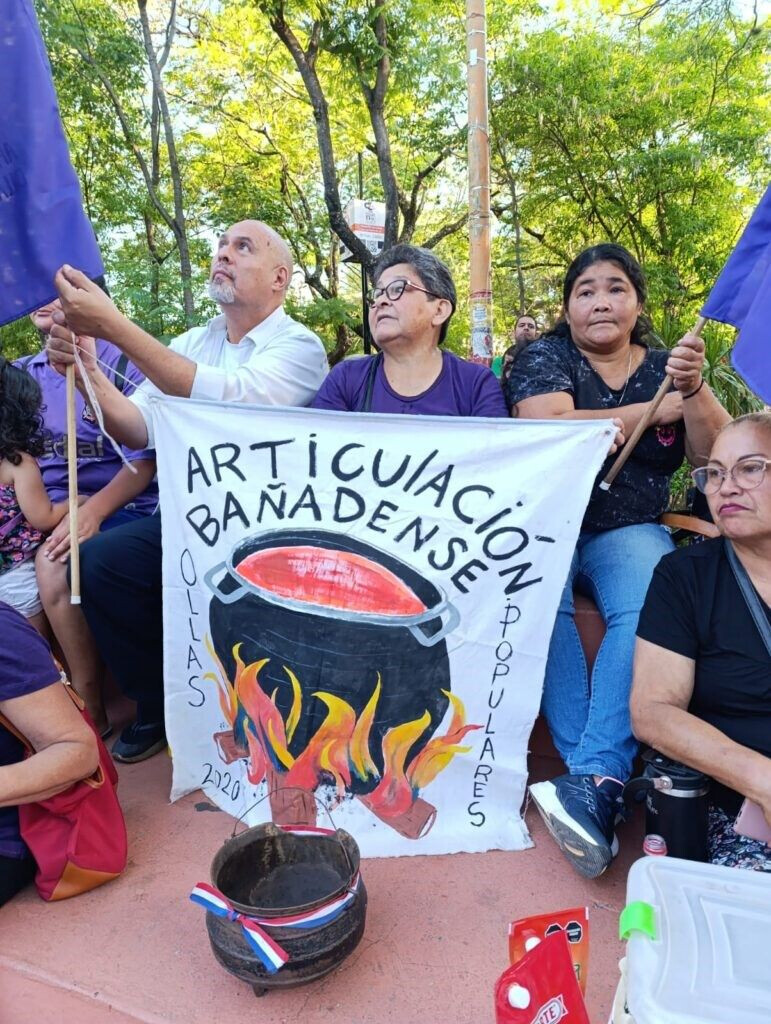
Asunción, Paraguay - In the heart of Paraguay, where economic headwinds and persistent social disparities cast long shadows, a network of community-run soup kitchens, known locally as "ollas populares," offers more than just sustenance. These humble kitchens, often powered by wood-fired stoves and the tireless efforts of women, have become potent symbols of solidarity, resistance, and the unwavering spirit of Paraguayan communities. As the nation recently observed Paraguayan Women's Day on February 24th, the spotlight shines brightly on the remarkable women who fuel these vital lifelines.
For decades, even before the recent surge in economic hardship, women have been at the forefront of addressing hunger in their neighborhoods. The COVID-19 pandemic in 2020, which exacerbated existing vulnerabilities and led to widespread job losses, ignited an even stronger wave of community action.
Ña Eme's Enduring Flame of Pikui
In the marginalized Bañado Norte of Asunción, 68-year-old Emilia Medina, affectionately known as Ña Eme, has been a pillar of her community for over two decades, operating a soup kitchen that has evolved into a beacon of hope. When the pandemic struck, forcing many into unemployment, Ña Eme felt compelled to act. "The children told me to stay home, but I had to do something," she recounts. This sense of urgency led her to establish 'Pikui' (meaning "small" or "tiny" in Guarani, perhaps signifying humble beginnings), an organization that now coordinates a network of local soup kitchens.
What started with simple meals of chicken gizzards and cookies has grown into a daily operation providing over 180 nourishing meals. Pikui's efforts have garnered recognition and support, including collaborations with the National Emergency Secretariat (SEN), which provides essential supplies. Ña Eme's dedication highlights the crucial role of grassroots initiatives in responding to crises and filling the gaps where formal aid may fall short.
Ña Seve: Cultivating Community in San Pedro
Further north, in the rural community of Liberación, San Pedro department, 57-year-old Severina Insfrán, or Ña Seve, embodies the deep connection between food sovereignty and community well-being. As a member of CONAMURI (National Coordination of Rural and Indigenous Women Workers), Ña Seve understands the importance of local food systems. A mother of eleven, she dedicates her time to preparing and distributing around 75 meals each week. Her commitment extends beyond the kitchen; she incorporates the tomatoes and peppers she cultivates on her own land, ensuring the meals are not only filling but also nutritious and rooted in local produce.
"The situation hasn't improved much since the pandemic," Ña Seve explains, highlighting the ongoing economic challenges that make it difficult for families to afford basic necessities like vegetables and meat. Despite these hardships, her resolve to support her community remains unwavering. Her story underscores the vital role of small-scale farmers, particularly women, in maintaining food security at the local level.
A Hard-Won Legal Framework Faces Implementation Hurdles
The tireless advocacy of women like Ña Eme and Ña Seve and their collective organizing efforts culminated in a significant legal victory in 2019 with the passage of the 'Soup Kitchens and Community Dining Rooms Law.' Emilia Medina vividly recalls the moment, stating, "We learned that by organizing, we could win against the government." The law was intended to provide a framework for state support and recognition of these essential community initiatives.
However, the reality of implementation has presented new challenges. Both Emilia and Severina note a decrease in consistent supply support since the law's enactment. Additionally, bureaucratic requirements, such as meeting certain infrastructure standards, pose significant barriers for many grassroots soup kitchens operating with limited resources. "It's a law for the poor, but the reality is different," Ña Seve poignantly observes, emphasizing the gap between policy and lived experience.
Beyond the Meal: Food Sovereignty and Women's Empowerment
The "ollas populares" are more than just meal distribution points; they are vital spaces for community building and the assertion of food sovereignty. In a country where large-scale agribusiness often dominates the agricultural landscape, these women are on the front lines of advocating for more equitable and sustainable food systems. They champion the right of communities to control their own food production and distribution, ensuring that access to food is a fundamental right, not a privilege.
These gatherings also serve as crucial platforms for women to connect, share their experiences, and discuss issues affecting their lives and communities. The act of preparing and sharing food fosters a sense of solidarity and collective action. For Emilia Medina, the impact is deeply personal. "Seeing the children eat happily brings tears to my eyes," she shares, her voice filled with emotion and pride in the lasting positive impact of their work.
A Statistical Snapshot of the Struggle
The challenges faced by these women and their communities are reflected in national statistics. According to Paraguay's National Institute of Statistics (INE), approximately 25% of the population lived below the poverty line in 2023, a figure that underscores the persistent economic vulnerabilities within the country. This vulnerability is often more pronounced for women in rural areas, who face additional barriers related to land ownership, access to resources, and economic opportunities.
The Food and Agriculture Organization of the United Nations (FAO) has repeatedly highlighted the importance of local, community-led solutions in addressing food insecurity in Paraguay. Organizations like Pikui and the countless individual "ollas populares" exemplify the grassroots movements that are essential for building resilient and food-secure communities.
The stories of Ña Eme, Ña Seve, and countless other women across Paraguay who dedicate their time and energy to feeding their communities are a powerful testament to human resilience and the transformative power of collective action. While the legal recognition of their efforts is a significant step forward, ensuring the effective implementation of supportive policies and addressing the underlying issues of poverty and inequality remain critical to truly empowering these unsung heroines and strengthening the fabric of Paraguayan society.
[Copyright (c) Global Economic Times. All Rights Reserved.]




























